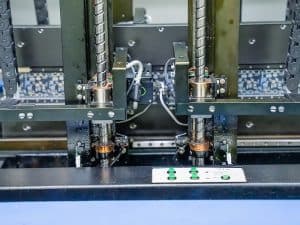Table of Contents.
ToggleTransforming Service Industries: The Power of PCB Manufacturing
The service industry is undergoing a revolution in today’s tech-driven society, propelled by developments in electronics. Printed Circuit Boards (PCBs) lie at the core of these advances. PCBs are revolutionizing the delivery of services, making them more effective, dependable, and creative across various industries, including financial services, logistics, and healthcare. This essay explores how the popular science being used by PCB manufacturing is changing the service business.
The Science Behind PCBs
In contemporary electronics, printed circuit boards often go unnoticed. They sustain numerous components mechanically and electrically, acting as the foundation of electronic gadgets. PCB manufacturing requires several crucial procedures, including:
- Design: Creating a schematic diagram that shows the connections between electronic components is the first step in the process. A PCB layout is then created from this design using specialist software.
- Material Preparation: A thin layer of copper is applied to the base material, usually fiberglass or epoxy.
- Printing the Circuit Pattern: To print the circuit pattern, a photoresist is applied, developed, and exposed to UV light through a photomask.
- Etching: Only the intended circuit routes remain after the superfluous copper is removed from the board through etching.
- Drilling: To mount components and create vias, precise holes must be drilled.
- Plating and Coating: A solder mask is added after the drilled holes have been plated to protect the traces.
- Silkscreen Printing: The board is printed with labels and reference designators.
- Testing: To guarantee functionality and dependability, the PCB is put through a rigorous testing process.

Healthcare: Revolutionizing Patient Administration
PCBs play a critical role in the healthcare industry by facilitating the creation of advanced medical equipment. For example, flexible PCBs are used in wearable health monitors to continuously track vital indicators and transmit real-time data to healthcare specialists. Better health outcomes and proactive patient care are made possible by this innovation. High precision and dependability are ensured by advanced PCBs in diagnostic devices like pacemakers and MRI machines, which is essential for patient safety.
Telecommunications: Improving Connectivity
PCBs are essential components of telecommunications equipment that enable international connection. High-frequency PCBs are necessary for 5G infrastructure, routers, and smartphones to enable faster data transmission and better communication. These PCBs’ accuracy and dependability guarantee continuous operation, which is crucial in our increasingly interconnected world. PCBs will be essential to providing quicker and more dependable communication services as 5G technology develops.
Financial Services: Securing Transactions
Robust PCBs are essential to the financial services industry’s ability to execute transactions securely. To safeguard confidential information and maintain the integrity of financial operations, reliable PCBs are necessary for ATMs, point-of-sale terminals, and secure servers. Advances in printed circuit board (PCB) manufacture have resulted in gadgets that are more efficient and secure, fostering user confidence and protecting financial transactions.
 Transportation and Logistics: Increasing Productivity
Transportation and Logistics: Increasing Productivity
The transportation and logistics industries gain a great deal from PCB technological developments. Modern automobiles such as electric cars and drones that self-operate, have complex electronic systems driven by dependable PCBs. These systems improve operational efficiency and save downtime by handling everything from GPS navigation to engine control. PCBs will play a more crucial part in this industry as the need for faster and more efficient logistical solutions increases.
Conclusion
PCB manufacturing is boosting service delivery and stimulating innovation in many industries. Services are becoming more connected, dependable, and efficient as a result of PCB technological breakthroughs.
The revolution in service sectors will only quicken as we explore the potential of popular science in PCB manufacturing. Businesses that adopt these innovations will be able to maintain their competitiveness and provide their clients with better products and services.



-300x225.jpg)







